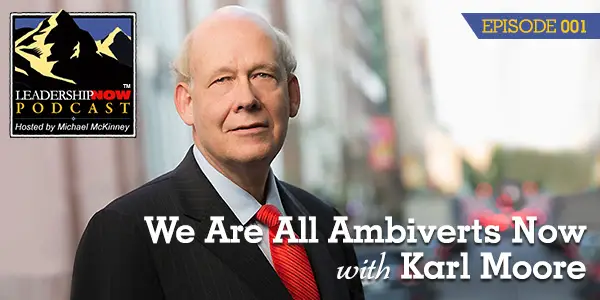
Episode #001: Karl Moore – We Are All Ambiverts Now
  
Karl Moore is a professor at McGill University, an Oxford University Associate Fellow, and author of the upcoming book, OK Boomer: Working with Millennials and Generation Z. He hosts a weekly program called, “The CEO Series” where he interviews global thought and business leaders one-on-one. He has done extensive research on introverts and extroverts, and ambiverts. He has recently presented his research on introverts at Harvard Business School, Oxford, IMD, and the Stanford Business School.
The LeadershipNow Podcast Show Notes
- “The literature about executives said that essentially almost all executives are extroverts, but it was based on anecdotal data. No one had ever actually talked to CEOs in numbers about it.”
- “Introverts love people—love being with people, but when they get too much stimulation, they can’t take it anymore. They take introvert breaks to recharge. So, they do things like walk the dog, listen to Mozart, sit and read a book. Extroverts love stimulation. Much more positive response to it. In fact, if they don’t get enough stimulation, they take an extrovert break.”
- “It is somewhat in our DNA. It’s our hard wiring to some degree. So, to some degree, nature made us that way. C’est la vie. Be comfortable. Enjoy being with who you are. It’s the way you are. Don’t get too wound up about it.”
- “When I heard about ambiverts I go, they just sounded like better human beings than you and I. So, I started interviewing someone and found out that there were a couple of weaknesses to ambiverts. One is they’re not as strong at the strengths of an introvert or extrovert as an actual introvert or extrovert, so they don’t have the same strengths. And secondly, they’re confusing to people.”
- “With an ambivert, you can’t predict what they’re going to do, and so they are kind of confusing to most people, and they throw us off a bit. So being an ambivert is something we aspire to, but I recognize that my hard-wiring is that of an extrovert, so I learn to be like an introvert at times, but recognize there are limits to how long I can do that for.”
- “There was a shift in American and Canadian societies and Western European to some degree as well, from the rural to the big city, and the skill sets you needed to be successful in the big city are different from being on the farm with your family. And so, there was a shift from the more introverted farmer lifestyle to more extroverted— the salesperson, a person getting out there and winning friends and influencing people, a shift we saw in America and kind of led to this false ideal of the extrovert as the only leader.”
- “There are quieter leaders, which is great because that’s what’s required at the time, and it’s not about them. It’s not about calling attention to themselves. We’re not saying the charisma of this person is so stunning that the rest of us just bow as they go by. That to your point, that leadership is about other people accomplishing things to a very large degree, so if you’re empowering them, if you’re helping them see their value and their gifts—and that is a big part of leadership to my mind—that is kind of less of a focus on yourself and more on the other person—is what I think is an element of great leadership in today’s world, which in some ways an introvert might have a bit of an advantage, but extroverts can learn to do that as well.”
- “If you’re a CEO or senior leader you’ve demonstrated leadership, So that’s something that you’ve shown. You’ve changed—evolved as a person because of the requirements of what you’re doing.”
- “Now, if you’re a heads-down AI programmer, and you’ve done it for ten or fifteen years, that’s great. We pay you a lot of money. We love you. But you’ve evolved differently than someone who became the IM manager, then became the vice-president, then became the CEO of an AI company.”
- “There’re a lot of people working from home. But I think we’re missing a cultural element. We’re missing friendships to some degree, social cohesion at work, and a big question that I’m talking to my students about is how does an organization teach you their culture if you’re just working from home.”
- “I think it’s human, particularly for extroverts, to want to be with people and the stimulation that comes from it. And I genuinely think we’re missing things by not being at work.”
Resources

Subscribe using your favorite podcast app via:
Apple Podcasts
Spotify
Amazon
Spread the Word. Leave a Rating and Review.
Hopefully, this episode has helped you unlock your potential as a leader. If you appreciated it, could you share the love?
The best way to do that is to rate the podcast on Apple Podcasts and leave us a brief review! Your ratings and reviews help us place the podcast in front of new leaders and listeners.
You can also send feedback to Michael McKinney. Your feedback also lets me know how I can better serve you.
Thank you for your support!
|



